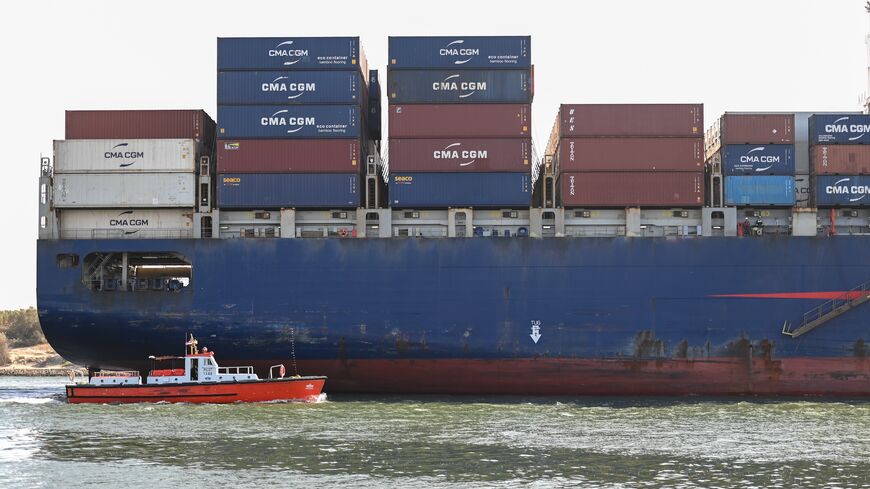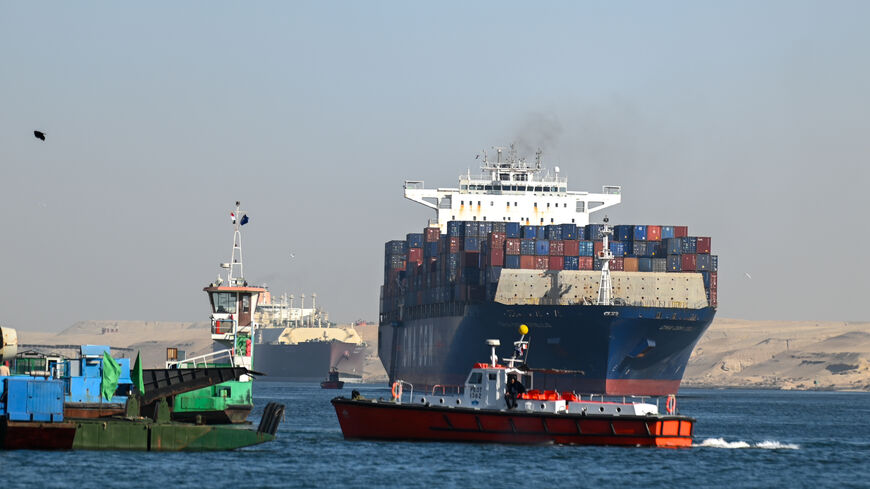Egypt’s Sisi: Suez Canal revenue down as much as 50% over Red Sea attacks
The decrease in revenue and traffic in the canal due to attacks by Yemen’s Houthi rebels is exacerbating Egypt’s foreign currency shortage and overall economic crisis.

The Suez Canal’s revenue has fallen by up to 50% this year due to attacks by Yemen’s Houthi rebels, Egyptian President Abdel Fattah al-Sisi said on Monday, the latest indication that the turmoil in the Red Sea is hurting Egypt’s fragile economy.
Sisi said during a conference with oil companies that Suez Canal revenue has decreased 40-50% so far this year. “Egypt must continue to pay companies and partners,” he lamented, according to Agence France-Presse.
The remarks follow a similar assessment by the Suez Canal Authority last month. The authority’s head, Osama Rabie, said then that traffic fell 30% from Jan. 1-11, while dollar revenues dropped 40%.
The decreased revenue is due to attacks by the Houthi rebels in Yemen on international ships in the Red Sea. The Iran-backed group has intensified attacks on ships in the strategic waterway, which connects to the Suez Canal, for years, since the start of the Israel-Hamas war in Gaza. The Houthis say the ships they attack are connected to Israel, though many of them have no ties to the country.
Several rounds of US and UK airstrikes have thus far failed to deter the Houthis. On Monday, the group hit the Belize-flagged carrier Rubymar with a missile.
The French Defense Ministry said on Tuesday it shot down two drones over the Red Sea overnight, originating from Yemen
Many international shipping firms have been avoiding the Suez Canal by sailing around the African continent in order to evade the attacks.
Why it matters: The decrease in Suez Canal revenue could worsen Egypt’s foreign currency shortage. The shortage has its roots in the COVID-19 pandemic, when tourism decreased. Rising oil and wheat prices following the 2022 Russian invasion of Ukraine exacerbated the situation. The canal is another major source of foreign currency for Egypt, and revenue reached a record $9.4 billion during the fiscal year that ended last June.
The US credit rating giant S&P Global reported in January that Egypt’s “already constrained foreign-currency position is suffering from the reduction in traffic through the Suez Canal.”
Some Egyptian banks placed restrictions on foreign currency transactions in January due to the shortage, Bloomberg reported at the time, following similar moves in October.
The foreign currency shortage is not the only economic issue plaguing Egypt. Annual inflation hit an all-time high of 39.7% last August. Inflation has eased somewhat since then and was 35.2% in December.
Sisi announced several wage hikes for Egyptian workers last week in an effort to ease their economic burdens.
The Egyptian Central Bank has also devalued the pound three times since early 2022 in order to unlock a $3 billion aid package from the International Monetary Fund. One stipulation of the aid is a transition to a more flexible exchange rate.
One US dollar is currently worth 31 Egyptian pounds. S&P Global predicted in January that Egypt will devalue the pound further to make the official rate closer to the rate on the street of approximately 60 pounds to the dollar.
Know more: India and the United Arab Emirates pledged last week to further advance the India-Middle East-Europe Economic Corridor. The shipping and rail network would establish a trade corridor from India to Europe via the Arabian peninsula and Israel, thus bypassing the Suez Canal.









